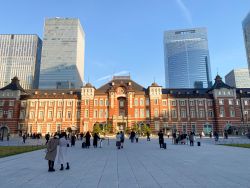
February 4, 2014
Coco Juku
Three staffers give their take on life at the new English school
By Metropolis
Originally published on metropolis.co.jp on February 2014

FULL-TIME INSTRUCTOR
John Thompson, 27 (UK)
Where are you from?
I come from Manchester, in the U.K.
How long have you been in Japan?
I’ve lived here for the past two years.
Why did you decide to come to Japan?
I participated in a university exchange program in Tokyo back in 2008.
What did you do before you started working at Coco Juku?
I was working as a sales assistant at a publishing company in London.
How long do you plan to stay in Japan?
At the moment, two or three more years, but you never know.
What are some of your future goals?
I like writing, so someday I would like to write a book about my travels in Japan and other parts of Asia.
Why do you like working at Coco Juku? How does it compare to working at other schools?
It offers a lot more job security than other companies I have worked for in Japan. The pay does not fluctuate from month to month, so that is a plus for me. I have enough time each day to prepare lessons and talk with the Japanese staff and other instructors in my school.
What is a typical work day like at Coco Juku? Give us an example of a day’s schedule…
I work mostly from noon to 9pm on weekdays and a little earlier on weekends. I usually come in and check my schedule, prepare my lessons for the day, and then speak with the school’s manager and counselors about new student visits or other administrative tasks. After that, I teach my classes and complete the records paperwork for each class and student. That’s about it. I don’t have to take work home with me—so my time off is mine to enjoy.
PART-TIME INSTRUCTOR
Steven Taylor, 24 (Australia)

Where are you from?
I come from Australia, around the Cairns area. Most Japanese people know about Cairns.
How long have you been in Japan?
I came here in May of 2013 on a working holiday visa.
Why did you decide to come to Japan?
I have a lot of Japanese friends back in Australia, and they encouraged me to come and experience Japan for myself.
What did you do before you started working at Coco Juku?
I was an event planner for a large hotel in Cairns.
How long do you plan to stay in Japan?
For as long as I can, I hope. Japan is a great place to live.
What’s your goal in the future?
I want to work as a translator for Japanese companies doing business in Australia.
How does a part-time work schedule at Coco Juku fit your lifestyle?
I usually work in the evenings, so the part-time schedule lets me focus on my Japanese studies in the mornings.
What is a typical work day like at Coco Juku?
I generally work from around 4 to 9pm during the week and on Saturday from 10am to 3pm. I usually teach adults a lot in the evenings, but on weekends there is a good mix of adults and kids classes.
HR Manager
Adrian Carrol, 38 (US)
When do you usually hire teachers?
We look for qualified candidates year round, with the busy season being January to March. Coco Juku expanded greatly in 2012, so there was a real demand for us to find quality instructors to fill the positions we had available.
What are the qualifications for people wanting to work at Coco Juku?
Prior teaching experience is always a plus, as is a teaching qualification such as TEFL, TESOL or CELTA. There are certain standards we look for in terms of communication skills and motivation for teaching, so there are a number of factors we use determine our ideal applicants. We consider a range of candidates from more recent graduates with a few years of work experience to seasoned teachers already living in Japan.
What are the salary details for full-time and part-time positions?
We offer a salary range from ¥250,000 to ¥265,000 per month for full-time instructors, depending on the location. For part-time staff, the teaching wage can range from ¥1,800 to ¥2,200 per hour.
What benefits does Coco Juku offer staff compared to other schools?
We offer many benefits that other schools deny their employees. The big one has to be union representation, as most of the other schools shy away from any form of union representation for their employees. We offer a stable salary each month along with enrollment in the National Health and Pension scheme and unemployment insurance. Inside the classroom, we offer state-of-the-art technology with our interactive whiteboards. This makes the lessons more interesting and fun for both students and instructors alike. Since Coco Juku is new to the eikaiwa world, all of our schools have that new feel to them. You notice it as soon as you enter the location. Finally, for new employees, we offer a comprehensive five-day training program that supports and develops instructors. Instructors receive ongoing follow-up training throughout the duration of their employment.
How many locations does your school have in Japan? Are teachers able to choose which school they work at?
Coco Juku has over 75 schools from Hokkaido in the north to Okinawa in the south. Allocation of instructors depends on the needs of the area. Some candidates with spousal visas can only work in certain areas due to their living arrangements, and we try to take that into account when assigning someone to a school. For candidates coming from overseas, we ask for their preference in terms of location. We do our best to meet their requests but in the end distribution depends on the needs of the company.
Info:
Coco Juku is hiring new teachers now. If you’d like to apply, send an email with your CV and cover letter to:
coco-apps@nichiigakkan.co.jp
Coco Juku
2-9 Kanda-Surugadai, Chiyoda-ku
www.cocojuku.jp







